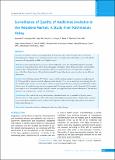Please use this identifier to cite or link to this item:
https://hdl.handle.net/20.500.14356/1724| Title: | Surveillance of Quality of Medicines Available inthe Nepalese Market: A Study from Kathmandu Valley |
| Authors: | Gyanwali, P Humagain, B R Aryal, K K Pandit, A Acharya, T Bista, B Dhimal, M Karki, K B |
| Citation: | GyanwaliP., HumagainB. R., AryalK. K., PanditA., AcharyaT., BistaB., DhimalM., & KarkiK. B. (2016). Surveillance of Quality of Medicines Available inthe Nepalese Market: A Study from Kathmandu Valley. Journal of Nepal Health Research Council. https://doi.org/10.33314/jnhrc.v0i0.678 |
| Issue Date: | 2015 |
| Publisher: | Nepal Health Research Council |
| Article Type: | Original Article |
| Keywords: | Counterfeit medicine Substandard medicine Quality of drugs |
| Series/Report no.: | Sep-Dec, 2015;678 |
| Abstract: | Abstract Background: Many countries are having problem of substandard and counterfeit drugs which results in lifethreatening issues, financial loss of consumers and loss in trust on health system. This study is concerned with the assessment of drugs quality available in the Nepalese market. Methods: A cross sectional survey was carried out in Kathmandu valley. Five different brands from each eightmolecules of drugs (Paracetamol tablet, Cloxacillin capsule, Amlodipine tablet, Metformin tablet, Losartan tablet, Cefixime tablet, Ofloxacin tablet, Carbamazepine tablet) were purposively selected. Registration compliancewas verified from Department of Drug Administration (DDA) and laboratorial analysis was done in two different laboratories. Results: Out of 40 drug samples, 90% did not comply with the existing regulatory requirement on labeling and42.5% brands did not mention about the pharmacopoeial standard. There was no uniformity in mentioning the selflife.Similarly,large variationwasseen on price of same genericdrugs. Laboratory analysisshowedthat40% samplesfailedto meet the standard among domestic companies and 28% among importedbrands.Altogether32.5% sampleswerefound to be of substandard quality.Only the resultof one sample matchedwith both laboratories.Thisindicatesthat there was variation in the selected two laboratories. Conclusions: The result of this survey indicates that, substandard medicines are available in Nepalese market.Moreover, there is weak regulation and no uniformity in similar pharmaceutical products. A larger study is requiredto access the quality of pharmaceutical products in the Nepalese market with testing of products in more than two independent laboratories. |
| Description: | Original Article |
| URI: | http://103.69.126.140:8080/handle/20.500.14356/1724 |
| ISSN: | Print ISSN: 1727-5482; Online ISSN: 1999-6217 |
| Appears in Collections: | Vol. 13 No 3 Issue 31 Sep-Dec 2015 |
Files in This Item:
| File | Description | Size | Format | |
|---|---|---|---|---|
| 678-Article Text-1268-1-10-20160317.pdf | Full text Article | 197.6 kB | Adobe PDF |  View/Open |
Items in DSpace are protected by copyright, with all rights reserved, unless otherwise indicated.
